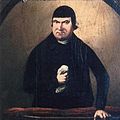History

The Countess of Huntingdon's Connexion was founded in 1783 by Selina Hastings, Countess of Huntingdon, as a result of the Evangelical Revival. It seceded from the Church of England, founded its own training establishment – Trevecca College – and built up a network of chapels across England in the late 18th century. [2]
In 1785 John Marrant (1755–1791), an African American from New York and the South who settled in London after the American Revolutionary War, became ordained as a minister with the connexion. He was supported in travel to Nova Scotia as a missionary to minister to the Black Loyalists who had been resettled there by the Crown. Many of the members of the congregation which he organized in Birchtown, Nova Scotia later chose to emigrate and resettle in Sierra Leone, the new British colony in West Africa. What was called a Province of Freedom was founded in 1792. [3] Additional Connexion churches were founded in Sierra Leone (see below), and the British and Sierra Leone movements re-established contact in 1839. [4]
The connexion had earlier efforts at congregation building in Canada. In the 1850s, the entrepreneur Thomas Molson built a church for the connexion near his brewery in Montreal. It was poorly attended as the city's population was predominantly Catholic. The building was adapted for use as a military barracks. [5]
The Countess of Huntingdon's gave strong support to the Calvinistic Methodist movement in Wales in the 18th and early 19th centuries, including the foundation of a theological college at Trefeca (Trevecca) in 1760. [6]


